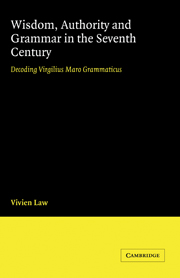Book contents
- Frontmatter
- Contents
- Preface
- Abbreviations
- Introduction
- 1 The outer layers: parody and word-play
- 2 The wisdom tradition
- 3 Avarice and the four keys to wisdom
- 4 The multifarious nature of wisdom
- 5 Heretical knowledge? The constitution of man
- 6 The Epistolae: Virgilius' Retractatio?
- 7 Concealment of mysteries: the techniques of secrecy
- 8 Virgilius and the seventh century
- 9 Conclusion
- Appendix 1 Epistola II 14-93: The vocative of ego
- Appendix 2 Epitome XV: The catalogue of grammarians
- Notes
- Works cited
- Index
9 - Conclusion
Published online by Cambridge University Press: 10 November 2009
- Frontmatter
- Contents
- Preface
- Abbreviations
- Introduction
- 1 The outer layers: parody and word-play
- 2 The wisdom tradition
- 3 Avarice and the four keys to wisdom
- 4 The multifarious nature of wisdom
- 5 Heretical knowledge? The constitution of man
- 6 The Epistolae: Virgilius' Retractatio?
- 7 Concealment of mysteries: the techniques of secrecy
- 8 Virgilius and the seventh century
- 9 Conclusion
- Appendix 1 Epistola II 14-93: The vocative of ego
- Appendix 2 Epitome XV: The catalogue of grammarians
- Notes
- Works cited
- Index
Summary
Pascals twin errors — (1) prendre tout littéralement, (2) prendre tout spirituellement — hover forebodingly before the eyes of anyone who ventures upon the exegesis of so mischievous a text. Virgilius, we may be sure, will not suffer his mantle of secrecy to be lifted without conjuring up a sudden gust to tangle it around the heads of the incautious. Some readers will undoubtedly feel that to see in his writings elements of esoteric traditions is to succumb to his parodistic obfuscation. (But how can one parody something which is not at least a possibility?)
No single slogan will capture all of Virgilius' messages, no ‘single road to be kept to always’. He is by turns grammarian, etymologist, parodist, tease, heretic, pupil and guardian of the mysteries. Only a reading which does justice to all these manifold aspects, revealing ever-new levels nestling one within the other, can begin to make manifest how he meant to be understood. One thing is plain, and that is that Virgilius is an enigma by choice. His deformations of Latin show none of the insecurity, the oscillating case-endings and erratic syntax of the unschooled; his is the wilful usage of a disciplined and word-happy mind. His verbal games — puns, pregnant names, semantic shirts, even scinderatio fonorum — have their roots in tradition. Augustine, Gregory and Isidore justified biblical obscurity, leaving it to others to imitate it. Like all hermeticists, from the authors of the Hisperica famina to the Old Icelandic scaldic poets and the troubadours of the trobar clus, Virgilius sees to it that the key is there for those with the eyes to see it and the will to use it.
- Type
- Chapter
- Information
- Wisdom, Authority and Grammar in the Seventh CenturyDecoding Virgilius Maro Grammaticus, pp. 106 - 108Publisher: Cambridge University PressPrint publication year: 1995

